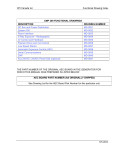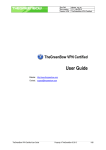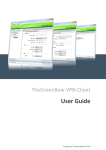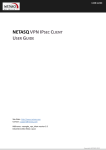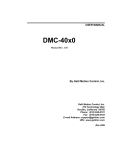Download DELL Latitude 10 64GB Black
Transcript
Dell Latitude 10 – ST2 Owner's Manual Regulatory Model: T05G Regulatory Type: T05G001 Notes, Cautions, and Warnings NOTE: A NOTE indicates important information that helps you make better use of your computer. CAUTION: A CAUTION indicates either potential damage to hardware or loss of data and tells you how to avoid the problem. WARNING: A WARNING indicates a potential for property damage, personal injury, or death. © 2013 Dell Inc. Trademarks used in this text: Dell™, the DELL logo, Dell Precision™, Precision ON™,ExpressCharge™, Latitude™, Latitude ON™, OptiPlex™, Vostro™, and Wi-Fi Catcher™ are trademarks of Dell Inc. Intel®, Pentium®, Xeon®, Core™, Atom™, Centrino®, and Celeron® are registered trademarks or trademarks of Intel Corporation in the U.S. and other countries. AMD® is a registered trademark and AMD Opteron™, AMD Phenom™, AMD Sempron™, AMD Athlon™, ATI Radeon™, and ATI FirePro™ are trademarks of Advanced Micro Devices, Inc. Microsoft®, Windows®, MS-DOS®, Windows Vista®, the Windows Vista start button, and Office Outlook® are either trademarks or registered trademarks of Microsoft Corporation in the United States and/or other countries. Blu-ray Disc™ is a trademark owned by the Blu-ray Disc Association (BDA) and licensed for use on discs and players. The Bluetooth® word mark is a registered trademark and owned by the Bluetooth® SIG, Inc. and any use of such mark by Dell Inc. is under license. Wi-Fi® is a registered trademark of Wireless Ethernet Compatibility Alliance, Inc. 2013 – 04 Rev. A02 Contents Notes, Cautions, and Warnings...................................................................................................2 1 Working on Your Computer.......................................................................................................5 Before Working Inside Your Computer.....................................................................................................................5 Turning Off Your Computer.......................................................................................................................................6 After Working Inside Your Computer........................................................................................................................6 2 Overview.......................................................................................................................................7 Stylus........................................................................................................................................................................7 Stylus Information..............................................................................................................................................7 Calibrating the Stylus................................................................................................................................................7 Using a Stylus in a Tablet.........................................................................................................................................8 Using the Stylus as a Mouse..............................................................................................................................8 Using the Stylus or Finger on Touch Keyboard..................................................................................................8 Touch Keyboard.................................................................................................................................................8 Working with Files..............................................................................................................................................8 Entering Text......................................................................................................................................................9 Stylus Flicks........................................................................................................................................................9 Pen and Touch Settings...................................................................................................................................10 Touch Usage....................................................................................................................................................11 3 Removing and Installing Components...................................................................................13 Recommended Tools..............................................................................................................................................13 Internal and External View.....................................................................................................................................13 Removing the Battery.............................................................................................................................................14 Installing the Battery..............................................................................................................................................15 Removing the Base Cover.......................................................................................................................................15 Installing the Base Cover........................................................................................................................................17 Removing the Front Camera...................................................................................................................................17 Installing the Front Camera.....................................................................................................................................18 Removing the Speakers..........................................................................................................................................18 Installing the Speakers...........................................................................................................................................20 Removing the SmartCard Reader ..........................................................................................................................20 Installing the SmartCard Reader ............................................................................................................................21 Removing the Wireless Wide Area Network (WWAN) Card .................................................................................21 Installing the Wireless Wide Area Network (WWAN) Card ..................................................................................22 Removing the Docking Board.................................................................................................................................22 Installing the Docking Board..................................................................................................................................23 Removing the System Board...................................................................................................................................23 Installing the System Board....................................................................................................................................24 Removing the Rear Camera....................................................................................................................................25 Installing the Rear Camera.....................................................................................................................................25 Removing the Coin-Cell Battery..............................................................................................................................26 Installing the Coin-Cell Battery...............................................................................................................................26 4 System Setup.............................................................................................................................29 Entering System Setup (BIOS)................................................................................................................................29 System Setup Navigation.......................................................................................................................................29 Boot Menu..............................................................................................................................................................30 System Setup (BIOS) Options.................................................................................................................................30 5 Troubleshooting Your Computer.............................................................................................35 Enhanced Pre-boot System Assessment (ePSA)...................................................................................................35 Running the ePSA Diagnostic Utility.......................................................................................................................35 Beep Codes.............................................................................................................................................................36 LED Error Codes......................................................................................................................................................37 Troubleshooting the Wacom Digitizer....................................................................................................................38 Troubleshooting Steps.....................................................................................................................................38 6 Specifications............................................................................................................................39 7 Contacting Dell..........................................................................................................................43 Working on Your Computer 1 Before Working Inside Your Computer Use the following safety guidelines to help protect your computer from potential damage and to help to ensure your personal safety. Unless otherwise noted, each procedure included in this document assumes that the following conditions exist: • You have performed the steps in Working on Your Computer. • You have read the safety information that shipped with your computer. • A component can be replaced or--if purchased separately--installed by performing the removal procedure in reverse order. WARNING: Before working inside your computer, read the safety information that shipped with your computer. For additional safety best practices information, see the Regulatory Compliance Homepage at www.dell.com/ regulatory_compliance CAUTION: Many repairs may only be done by a certified service technician. You should only perform troubleshooting and simple repairs as authorized in your product documentation, or as directed by the online or telephone service and support team. Damage due to servicing that is not authorized by Dell is not covered by your warranty. Read and follow the safety instructions that came with the product. CAUTION: To avoid electrostatic discharge, ground yourself by using a wrist grounding strap or by periodically touching an unpainted metal surface, such as a connector on the back of the computer. CAUTION: Handle components and cards with care. Do not touch the components or contacts on a card. Hold a card by its edges or by its metal mounting bracket. Hold a component such as a processor by its edges, not by its pins. CAUTION: When you disconnect a cable, pull on its connector or on its pull-tab, not on the cable itself. Some cables have connectors with locking tabs; if you are disconnecting this type of cable, press in on the locking tabs before you disconnect the cable. As you pull connectors apart, keep them evenly aligned to avoid bending any connector pins. Also, before you connect a cable, ensure that both connectors are correctly oriented and aligned. NOTE: The color of your computer and certain components may appear differently than shown in this document. To avoid damaging your computer, perform the following steps before you begin working inside the computer. 1. Ensure that your work surface is flat and clean to prevent the computer cover from being scratched. 2. Turn off your computer. 3. If the computer is connected to a docking device (docked), undock it. CAUTION: To disconnect a network cable, first unplug the cable from your computer and then unplug the cable from the network device. 4. Disconnect all network cables from the computer. 5. Disconnect your computer and all attached devices from their electrical outlets. 6. Turn the computer upside-down on a flat work surface. 5 NOTE: To avoid damaging the system board, you must remove the main battery before you service the computer. 7. Remove the main battery. 8. Turn the computer top-side up. 9. Press the power button to ground the system board. CAUTION: To guard against electrical shock, always unplug your computer from the electrical outlet before opening the display. CAUTION: Before touching anything inside your computer, ground yourself by touching an unpainted metal surface, such as the metal at the back of the computer. While you work, periodically touch an unpainted metal surface to dissipate static electricity, which could harm internal components. 10. Remove any installed SmartCards from the slots. Turning Off Your Computer CAUTION: To avoid losing data, save and close all open files and exit all open programs before you turn off your computer. 1. Shut down the operating system: – Windows 8: * Using a touch-enabled device: Swipe in from the right edge of the screen, opening the Charms menu and select Settings. Select the * and then select Shut down Using a mouse: Point to upper-right corner of the screen and click Settings. Click on the down. 2. and then select Shut Ensure that the computer and all attached devices are turned off. If your computer and attached devices did not automatically turn off when you shut down your operating system, press and hold the power button for about 4 seconds to turn them off. After Working Inside Your Computer After you complete any replacement procedure, ensure you connect any external devices, cards, and cables before turning on your computer. CAUTION: To avoid damage to the computer, use only the battery designed for this particular Dell computer. Do not use batteries designed for other Dell computers. 1. Connect any external devices, such as a port replicator, battery slice, or media base, and replace any cards, such as an ExpressCard. 2. Connect any telephone or network cables to your computer. CAUTION: To connect a network cable, first plug the cable into the network device and then plug it into the computer. 3. Replace the battery. 4. Connect your computer and all attached devices to their electrical outlets. 5. Turn on your computer. 6 Overview 2 Your Dell Latitude 10-ST2 tablet is built for business with easy management and security. It provides: • world class security • easy management • long term stability It is shipped with Windows 8 operating system to fully utilize the touch experience. NOTE: It is recommended that you immediately backup the operating system image using the USB device through Dell Backup and Recovery (DBAR) application. Stylus The Latitude 10–ST2 uses several input devices, they are: • optional electrostatic pen (stylus) • external USB mouse/keyboard Stylus Information 1. Stylus tip 2. Right-click pen button 3. Eraser pen button Calibrating the Stylus The stylus can function at the default calibration or at a calibration set by you or by another user. It is recommended that you use the stylus only while it is calibrated to your personal calibration settings. Calibration optimizes stylus performance for each user. 1. Open Control Panel. 2. Double-click Tablet PC Settings. 3. On the Tablet PC Settings window, click Calibrate. 4. On the Calibrate pen or touch input screens, select Pen input. 7 Using a Stylus in a Tablet The stylus allows you to actively navigate through the menus. You can use it as a mouse and also as a pen. Using the Stylus as a Mouse You can use the stylus the same way you use a mouse or touch pad with a notebook computer. Holding the stylus near the display makes a small cursor appear. Moving the stylus moves the cursor. Table 1 describes how to use the stylus. Table 1. Electrostatic Pen Usage Appearance Action Function Gently tap the stylus tip on the screen of your Tablet PC Same as a single-click on a mouse. Gently tap the stylus tip twice in quick succession on the screen of your Tablet PC. Same as a double-click on a mouse. Touch the stylus on the screen and hold it in place Same as a right-click on a mouse. momentarily until Windows draws a complete circle around the cursor. Using the Stylus or Finger on Touch Keyboard The Touch Keyboard or Handwriting recognition makes it easy to enter text into your applications with the stylus or finer. Applications like Windows Journal, allow you to write with the stylus directly into the application window. Touch Keyboard Some of the Windows text input boxes will bring out the Touch Keyboard automatically when you tap on the boxes. When it does not come out, you can open the Touch Keyboard by clicking on the keyboard icon on the system toolbar. The Touch Keyboard is like a standard keyboard will appear on the screen which can be used to enter text by tapping the keys with your stylus pen or finger Working with Files You can open, delete, or move many files or folders at one time by selecting multiple items from a list. 1. Hover over one item at a time. 2. Select the check box that appears to the left of each item. To turn check boxes on: 1. Open Control Panel. 8 2. Go to Folder options. 3. Click View. 4. Under Advanced settings , select the Use check boxes to select items check box, and then click OK. Entering Text You can use handwriting recognition application or the touch keyboard to enter text. Table 2. Input Panel Icons Icon Name Function The touch keyboard is like a standard keyboard, you can enter text by tapping the keys with your stylus or finger. The touch keyboard is like a standard keyboard, you can enter text by tapping the keys with your stylus or your thumb. The writing pad and character pad convert handwriting into typed text. You can write continuously on the writing pad, like writing on a piece of lined paper. Use the character pad to enter one character at a time. The character pad converts your handwriting to typed text, one letter, number or symbol at a time, but does not take the context of the full word into account and does not take advantage of the handwriting dictionary. To switch to the character pad in Input Panel, tap Tools, and then Write character by character To minimize the Touch keyboard, click the minimize icon. Stylus Flicks Stylus flicks enable you to use the stylus to perform actions that normally require a keyboard, such as pressing <Page Up> or using the directional arrow keys. Stylus flicks are quick, directional gestures. You can quickly draw a short line in one of eight directions. When a stylus flick is recognized, the Tablet PC performs the action assigned. 9 Pen and Touch Settings Using the stylus, you can adjust how quickly you tap the screen when you double-tap the screen. It also allows you define the spatial tolerance. The Press and Hold settings allow you to define the speed and the duration for a right-click action. 10 Touch Usage One of the key advantages of the Tablet PC is the ability to easily switch from pen input to touch input. When you use Touch Mode , a translucent image of a computer mouse, called the touch pointer, floats beneath your finger. The touch pointer has left and right mouse buttons that you can tap with your finger. You use the area beneath the buttons to drag the touch pointer. To show the touch pointer, go to Control Panel → Pen and Touch and clicking on the Touch tab. In the Touch action section, select the option Show visual feedback when touching the screen 11 12 Removing and Installing Components 3 This section provides detailed information on how to remove or install the components from your computer. Recommended Tools The procedures in this document may require the following tools: • Small flat-blade screwdriver • #0 Phillips screwdriver • #1 Phillips screwdriver • Small plastic scribe Internal and External View Figure 1. External View 1. 2. 3. 4. 5. micro SIM card (located below the battery) SmartCard reader slot battery Secure Digital (SD) card slot fingerprint reader (optional) 13 Figure 2. Internal View 1. 2. 3. 4. 5. docking board coin-cell battery speaker system board front camera 6. rear camera 7. SmartCard reader/WWAN card (WWAN card is located below the SmartCard reader Removing the Battery 1. Follow the procedures in Before Working Inside Your Computer. 2. Slide the battery release latch to the unlock position. Lift up the battery in an outward direction and remove it from the computer. 14 Installing the Battery 1. Slide the battery into its slot until it clicks into place. 2. Follow the procedures in After Working Inside Your Computer. Removing the Base Cover 1. Follow the procedures in Before Working Inside Your Computer. 2. Remove the battery. 3. Remove the screws that secure the base cover to the computer. 15 4. Pry and release the tabs that secure the base cover by following the arrow sequence in the diagram. 5. Pry and lift the tabs that secure the base cover in the battery bay area in an upward direction. Pry and flip the base cover. 16 6. Lift the retention clasp in an upward direction and release the fingerprint reader cable outward to remove it from the system board. Lift the base cover away from the computer. Installing the Base Cover 1. Attach the fingerprint reader flex cable from the base cover to the system board. 2. Attach the base cover to the computer. 3. Push the edges of the base cover into the securing clips until they are fully engaged. 4. Tighten the screws to secure the base cover. 5. Install the battery. 6. Follow the procedures in After Working Inside Your Computer. Removing the Front Camera 1. Follow the procedures in Before Working Inside Your Computer. 2. Remove the: a) battery b) base cover 3. Lift up the connector latch and disconnect the camera cable. Remove the screw that secures the camera module to the computer. Remove the camera module from the computer. 17 Installing the Front Camera 1. Place the camera module in its slot on the computer. 2. Tighten the screw to secure the camera module to the computer. 3. Connect the camera cable to the connector. 4. Install the: a) base cover b) battery 5. Follow the procedures in After Working Inside Your Computer. Removing the Speakers 1. Follow the procedures in Before Working Inside Your Computer. 2. Remove the : a) battery b) base cover 3. Lift up the coin-cell battery from its slot and un-route its cabling from below the speaker. Disconnect the speaker connector from the system board. 4. Remove the screws that secure the speakers to the computer. 18 5. Un-route the speaker cables on the right-hand side of the computer and lift up to release the right speaker from the computer. 6. Un-route the speaker cables on the left-hand side of the computer and lift up to release the left speaker from the computer. 19 Installing the Speakers 1. Place the right and the left speakers in their slot. 2. Route the speaker cables on the chassis. 3. Tighten the screws to secure the speakers to the chassis. 4. Place the coin-cell battery in its slot and route the cables. 5. Connect the speaker connector cable to its port on the system board. 6. Install the : a) base cover b) battery 7. Follow the procedures in After Working Inside Your Computer. Removing the SmartCard Reader NOTE: The SmarCard reader is an optional component. 1. Follow the procedures in Before Working Inside Your Computer. 2. Remove the : a) battery b) base cover 3. 20 Remove the screws that secure the SmartCard reader to the system board and lift in an upward direction to remove it from the computer. Installing the SmartCard Reader 1. Place the SmartCard reader into its slot. 2. Tighten the screws to secure the SmartCard reader to the system board. 3. Install the : a) base cover b) battery 4. Follow the procedures in After Working Inside Your Computer. Removing the Wireless Wide Area Network (WWAN) Card NOTE: The WWAN Card is an optional component. 1. Follow the procedures in Before Working Inside Your Computer. 2. Remove the : a) battery b) base cover c) SmartCard reader 3. Disconnect antennae connected to the WWAN card. Lift up the system board connector to release the WWAN card. 21 4. Disconnect the screws that secure the WWAN card to the system board and lift it up to remove it from the computer. Installing the Wireless Wide Area Network (WWAN) Card 1. Slide the WWAN card into the slot. 2. Tighten the screws to secure the WWAN card to the computer. 3. Connect the system board side data cable to the WWAN card. 4. Connect the antennae according to the color code on the WWAN card. 5. Install the : a) SmartCard reader b) base cover c) battery 6. Follow the procedures in After Working Inside Your Computer. Removing the Docking Board 1. Follow the procedures in Before Working Inside Your Computer. 2. Remove the: a) b) c) d) e) f) battery base cover SmartCard reader WWAN Card speaker front camera 3. Lift up the connector latch and disconnect the docking board power flex cable from the connector. 4. Remove the screws that secure the docking board to the computer. 22 5. Remove the docking board from the computer and disconnect the home-button board cable. Installing the Docking Board 1. Connect the home-button board cable to the docking board and place the docking board in its slot in the computer. 2. Tighten the screws to secure the docking board to the computer. 3. Connect the docking board power flex cable to the connector. 4. Install the: a) b) c) d) e) f) 5. front camera speaker WWAN Card SmartCard reader base cover battery Follow the procedures in After Working Inside Your Computer. Removing the System Board 1. Follow the procedures in Before Working Inside Your Computer. 2. Remove the: a) b) c) d) e) battery base cover SmartCard reader WWAN card speaker 23 f) front camera g) docking board 3. Disconnect the LVDS and docking board flex cables. 4. Remove the screws that secure the system board to the computer. 5. Lift up the system board at a 45° angle and pull it away from the computer. Installing the System Board 1. Place the system board in its compartment on the computer. 2. Tighten the screws to secure the system board to the computer. 3. Install the: a) docking board b) front camera c) speaker d) WWAN card 24 e) SmartCard reader f) base cover g) battery 4. Follow the procedures in After Working Inside Your Computer. Removing the Rear Camera 1. Follow the procedures in Before Working Inside Your Computer. 2. Remove the: a) battery b) base cover c) SmartCard reader d) WWAN Card e) speaker f) front camera g) system board 3. Remove the camera module from the system board. Installing the Rear Camera 1. Place the camera module in its slot on the system board. 2. Install the: a) system board b) front camera c) speaker d) WWAN Card e) SmartCard reader f) base cover g) battery 25 3. Follow the procedures in After Working Inside Your Computer. Removing the Coin-Cell Battery 1. Follow the procedures in Before Working Inside Your Computer. 2. Remove the: a) b) c) d) e) f) g) 3. battery base cover SmartCard reader WWAN Card speaker front camera system board Disconnect the coin-cell battery cable and remove it from the system board. Installing the Coin-Cell Battery 1. Connect the coin-cell battery cable to the system board. 2. Install the: a) b) c) d) e) system board front camera WWAN Card SmartCard reader speaker 3. Replace the coin-cell battery in its slot on the computer. 4. Install the: a) battery b) base cover 26 5. Follow the procedures in After Working Inside Your Computer. 27 28 System Setup 4 System Setup enables you to manage your computer hardware and specify BIOS‐level options. From the System Setup, you can: • Change the NVRAM settings after you add or remove hardware • View the system hardware configuration • Enable or disable integrated devices • Set performance and power management thresholds • Manage your computer security Entering System Setup (BIOS) NOTE: Before entering the System Setup, you must connect a USB Keyboard to the USB port located on the right side of the computer or on the rear of the docking station if your computer is docked. 1. Turn on (or restart) your computer. 2. When the blue DELL logo is displayed, you must watch for the F2 prompt to appear. 3. Once the F2 prompt appears, press <F2> immediately. NOTE: The F2 prompt indicates that the keyboard has initialized. This prompt can appear very quickly, so you must watch for it to display, and then press <F2> . If you press <F2> before you are prompted, this keystroke will be lost. 4. The System Setup screen is displayed. 5. If you wait too long and the operating system logo appears, continue to wait until you see the Microsoft Windows desktop. Then, shut down your computer and try again. System Setup Navigation Use the following options to navigate through the System Setup screens: Keystroke Action < Esc > Exit from current view or switch the current view to the Exit page in the System Setup. <On Screen Keyboard Select this option to navigate the system setup using the on screen keyboard built into the Icon> tablet. < Up Arrow > or < Select an item to display. Down Arrow > ( when connected to an optional external USB keyboard) < Left Arrow > or < Right Arrow > ( when Select a menu to display. 29 Keystroke Action connected to an optional external USB keyboard) On Screen Mouse Pointer Use this to navigate the System Setup by using your finger or an interactive pen. Apply Icon Save current configuration. Defaults Icon Load setup defaults. Exit Icon Exits System Setup. Boot Menu Press <F12> when the Dell logo appears to initiate a one-time boot menu with a list of the valid boot devices for the system. Hard Drive Network Diagnostics and Enter Setup options are included in this menu. The devices listed on the boot menu depend on the bootable devices in the system. This menu is useful when you are attempting to boot to a particular device or to bring up the diagnostics for the system. Using the boot menu does not make any changes to the boot order stored in the BIOS. System Setup (BIOS) Options Table 3. System Information Option Function BIOS Version Displays the BIOS revision. Service Tag Displays the service tag of your tablet. Asset Tag Displays the asset tag of your computer. Ownership Tag Displays the ownership information. Manufacture Date Displays the date of manufacture. Ownership Date Displays the ownership date. Memory Installed Displays the memory installed on the computer. Memory Available Displays the memory available on the computer. Memory Speed Displays the memory speed. Table 4. Battery Information Option Function AC Adapter Displays the AC Adapter information. Battery Status Displays the current battery status. Battery Charge State Displays if the battery is charging/discharging. Battery Health Displays the battery health. 30 Table 5. Boot Sequence Option Function File Browser Add Boot Option Displays the order that the BIOS searches devices when trying to find an operating system to boot. A new device can be added here. File Browser Del Boot Option A displayed boot device can be removed from the boot order. Table 6. Date/Time Option Function System Date Displays the system date. System Time Displays the system time. Table 7. System Configuration Option Function USB Configuration Enables or Disables boot from a USB mass storage device. Default : Enabled Miscellaneous Devices Allows you to enable or disable various on-board devices. • • • • Enable/Disable Front Camera Device Enable/Disable Rear Camera Device Enable/Disable Media Card Device Enable/Disable GPS Table 8. Video Option Function LCD Brightness Displays the panel brightness when the ambient light sensor is off. • • Brightness on Battery Brightness on AC Table 9. Security Option Description Admin Password This field lets you set, change, or delete the administrator (admin) password (also known as the setup password). The admin password enables several security features. The drive does not have a password set by default. To add a new password: • • • Enter the old password Enter the new password Confirm the new password 31 Option Description Click OK after entering the password details. System Password Allows you to set, change, or delete the computer password (previously called the primary password). The drive does not have a password set by default. To add a new password: • • • Enter the old password Enter the new password Confirm the new password Click OK after entering the password details. Strong Password Enable strong password - This option is disabled by default. Password Configuration This field controls the minimum and maximum number of characters allowed for the admin and system passwords. Changes to these fields are not active until they are committed via the apply button or saving changes before exiting setup. • • • • Password Change Allows you to determine whether changes to the system and hard disk passwords are permitted when an administrator password is set. • Non-Admin Setup Changes Allow Non-Admin Password Changes (Default) This option lets you determine whether changes to the setup options are permitted when an administrator password is set. • TPM Security Admin Password Min Admin Password Max System Password Min System Password Max Allow Wireless Switch Changes (Default) This option lets you control whether the Trusted Platform Module (TPM) in the system is enabled and visible to the operating system. TPM Security (Default) NOTE: Activation, deactivation, and clear options are not affected if you load the setup program's default values. Changes to this option take effect immediately. PTT Allows you to enable or disable PTT Support. • • Computrace (R) This field lets you activate or disable the BIOS module interface of the optional Computrace Service from Absolute Software. • • • 32 PTT Security (Default) Revoke Trust (Default) Deactivate (Default) Disable Activate Option Description Admin Setup Lockout Allows you to enable or disable the option to enter setup when an admin password is set. • Enable Admin Setup Lockout (Default) Table 10. Secure Boot Option Function Secure Boot Enables or Disables the secure boot feature. Default : Disabled Expert Key Management Allows you to manage all secure boot keys. Table 11. Performance Option Description Multi Core Support Specifies whether the process will have one or all cores enabled. The performance of some applications will improve with the additional cores. • • • Intel SpeedStep All (Default) 1 2 Allows you to enable or disable the Intel SpeedStep mode of the processor. • C States Control Enable Intel(R) SpeedStep (Default) Allows you to enable or disable the additional processor sleep states. • Intel TurboBoost C states (Default) Allows you to enable or disable Intel TurboBoost mode of the processor. • Hyperthread Control Enable Intel TurboBoost (Default) — Allows the Intel TurboBoost driver to increase the performance of the CPU or graphics processor. This options allows users to enable and disable the Hyperthread Control. • Hyperthread Control (selected by default) Table 12. Power Management Option Description AC Behavior Allows the computer to power-uon automatically, when AC adapter is plugged. The option is disabled. • Wake on LAN Wake on AC This option allows the computer to power up from the off state when triggered by a special LAN signal. Wake-up from the Standby state is unaffected by this setting and must be enabled in the operating system. This feature only works when the computer is connected to AC power supply. 33 Option Description • • Disabled - Does not allow the system to power on by special LAN signals when it receives a wake-up signal from the LAN or wireless LAN. (Default ) LAN Only - Allows the system to be powered on by special LAN signals. Table 13. POST Behaviour Option Description Adapter Warnings Allows you to activate the adapter warning messages when certain power adapters are used. The option is enabled by default. • POST Hotkeys Enable Adapter Warnings Specifies whether the sign-on screen displays a message, that displays the keystroke sequence required to enter the BIOS Boot Option Menu. • Enable F12 Boot Option menu (Default). Table 14. Virtualization Support Option Description Virtualization This option specifies whether a Virtual Machine Monitor (VMM) can utilize the additional hardware capabilities provided by Intel Virtualization technology. • Enable Intel Virtualization Technology (Default) Table 15. Wireless Option Description Wireless Device Enable Allows you to enable or disable the wireless devices • • WLAN Bluetooth All options are enabled by default. Table 16. Maintenance Option Description Service Tag Displays the service tag of your computer. Asset Tag Allows you to create a system asset tag if an asset tag is not already set. This option is not set by default. Table 17. System Logs Option Description BIOS events Displays the system event log and allows you to clear the log. • 34 Clear Log Troubleshooting Your Computer 5 You can troubleshoot your computer using indicators like Diagnostic Lights, Beep Codes, and Error Messages during the operation of the computer. Enhanced Pre-boot System Assessment (ePSA) The ePSA is a diagnostic utility available on your computer. This utility includes a series of tests for a computer's hardware. You can run these tests even if the computer lacks any media (hard drive, optical drive, etc.). If a ePSA-tested component fails, the system displays an error code and generates a beep code. Features • Graphical User Interface • Automatic Default Operation- runs test on all devices, allowing a user to interrupt and select any device • Checks the Master Boot Record for readiness to boot into a full OS environment • Tablet panel test • Video memory test • Battery test • Charger test • Event log scan • Multiprocessor cache test Running the ePSA Diagnostic Utility NOTE: The following steps can be used to run the ePSA diagnostic utility in DOS mode without using an external keyboard. 1. Power on the system and immediately press the Volume Up key to begin the tests. 2. The computer will begin running the ePSA utility. 35 3. During the testing process, you will be prompted to answer a YES or NO question. To respond, press Volume Up = YES or Volume Down = NO. 4. Press the Security Button (<Ctrl> + <Alt> + <Del>) to click OK once the tests are completed. 5. The volume up and down buttons can also be used as the <Tab> key when switching between options. Beep Codes The computer may emit a series of beeps during start-up if the display cannot show errors or problems. These series of beeps, called beep codes, identify various problems. The delay between each beep is 300 ms, the delay between each set of beeps is 3 seconds, and the beep sound lasts 300 ms. After each beep and each set of beeps, the BIOS should detect if the user presses the power button. If so, BIOS will jump out from looping and execute the normal shutdown process and power system. 36 Code Cause and Troubleshooting Steps 1 BIOS ROM checksum in progress or failure System board failure, covers BIOS corruption or ROM error 2 No RAM detected No memory detected 3 Chipset Error (North and South Bridge Chipset, DMA/IMR/ Timer Error) , Time-Of-Day Clock test failure , Gate A20 failure , Super I/O chip failure , Keyboard controller test failure System board failure 4 RAM Read/Write failure Memory failure 5 Real-time clock power fail CMOS battery failure 6 Video BIOS test failure Video card failure 7 CPU - cache test failure Processor failure 8 Display Display failure LED Error Codes Diagnostic LED codes are communicated via the Power Button LED. The Power Button LED blinks the corresponding LED codes for the corresponding fault condition. Example: For No Memory detected (LED code 2) , The Power Button LED blinks two times followed by a pause, blinks two times, pause, etc. This pattern continues until the system is powered off. Code Cause and Troubleshooting Steps 1 System board: BIOS ROM failure System board failure, covers BIOS corruption or ROM error 2 Memory No memory/RAM detected 3 Chipset Error (North and South Bridge Chipset, DMA/IMR/ Timer Error) , Time-Of-Day Clock test failure , Gate A20 failure , Super I/O chip failure , Keyboard controller test failure System board failure 4 RAM Read/Write failure Memory failure 5 Real-time clock power fail 37 Code Cause and Troubleshooting Steps CMOS battery failure 6 Video BIOS test failure Video card failure 7 CPU - cache test failure Processor failure 8 Display Display failure Troubleshooting the Wacom Digitizer The Wacom Tablet Settings applet is used to adjust several settings for the digitizer. Once the Wacom drivers are loaded, an icon appears in the system tray. Troubleshooting Steps 1. Check the system information to see how many touch points are detected. – Right click Computer and select Properties from the menu. – Number of touch points will appear in the information window. NOTE: The touch points in the properties window indicate that the touch driver has been installed on the tablet. For more information on the installed driver, refer to the steps below. 38 • Open the Device Manager and check that the Digitizer is recognized by the tablet . • In order to verify this, navigate to Device Manager → Human Interface Devices → I2C HID Device. Right click on the Detail tab and choose Hardware IDs. • Verify if the device description lists Wacom and also check if a yellow exclamation mark appears alongside it. • If the device is not recognized, check if it is displayed under Unknown Devices and update the driver for the unknown device. 6 Specifications NOTE: Offerings may vary by region. The following specifications are only those required by law to ship with your computer. For more information regarding the configuration of your computer, click Start → Help and Support and select the option to view information about your computer. System Information Chipset Intel Atom Z2760 DRAM bus width 32-bit Flash EPROM SPI 4M bits Processor Type Intel Atom Z2760 External bus frequency 800 MHz Memory Memory capacity 2 GB Memory type LPDDR2 Audio Type Dual channel I2S codec Controller Realtek ALC3261 Stereo conversion 24-bit Interface: Internal I2 S audio interface External microphone-in and stereo headphones/speakers combo connector Speakers 2 x 1 W stereo speakers Internal speaker amplifier 1 W per channel Video Video type integrated Data bus internal Video controller Intel Graphics Media Accelerator 39 Communications Network adapter USB 2.0 based Gigabit LAN via dock Wireless mobile broadband card (optional) Ports and Connectors Audio one microphone-in and stereo headphones/speakers combo connector Video one mini HDMI connector USB one USB 2.0 connector Memory card reader one 3-in-1 memory card reader Display Type HD IPS LED Size 10.1 inches high definition (HD) Dimensions: Height 125.11 mm (4.93 inches) Width 222.52 mm (8.76 inches) Diagonal 255.28 mm (10.05 inches) Active area (X/Y) 222.52 mm / 125.11 mm Maximum resolution 1366 x 768 pixels Maximum brightness 450 nits Refresh rate 60 Hz Minimum viewing angles: Horizontal 80/80 Vertical 80/80 Pixel pitch 0.1629 x 0.1629 Battery Type 2–cell lithium ion (30 WHr) 4–cell lithium ion (60 WHr) Length 238.30 mm (9.38 inches) 238.30 mm (9.38 inches) Height 5.48 mm (0.22 inch) 10.03 mm (0.39 inch) Width 86.50 mm (3.40 inches) 86.50 mm (3.40 inches) Weight 220.00 g (0.49 lb) 373.00 g (0.82 lb) Voltage 7.4 VDC 7.4 VDC Dimensions 40 Battery Temperature range Operating 0 °C to 50 °C (32° F to 158 °F) 0 °C to 50 °C (32 °F to 158 °F) Non-Operating -20 °C to 65 °C ( –4 °F to 149 °F) -20 °C to 65 °C ( –4 °F to 149 °F) Coin-cell battery 3 V CR2025 lithium ion AC Adapter Type Input voltage 100 VAC to 240 VAC Input current (maximum) 0.87 A Input frequency 50 Hz to 60 Hz Output power 30 W Output current (30 W) 1.54 A Rated output voltage 19 Vdc/1.58 A; 19.5 Vdc/1.54 A Temperature range: Operating 0 °C to 35 °C (32 °F to 95 °F) Non-operating –40 °C to 65 °C (–40 °F to 149 °F) Physical Height (with security) 10.50 mm to 13.40 mm (0.41 inch to 0.53 inch) Width 274 mm (10.79 inches) Depth 176.60 mm (6.95 inches) Weight (minimum) 658 grams (1.51 lb) Environmental Temperature: Operating -25 °C to 85 °C Storage -40 °C to 85 °C Relative humidity (maximum): Operating Operating 10% to 90% (noncondensing) Storage Storage 5% to 95% (noncondensing) Altitude (maximum): Operating –16 m to 3048 m (–50 to 10,000 ft) Non-operating –15.2 m to 10,668 m (–50 ft to 35,000 ft) Airborne contaminant level G1 as defined by ISA-71.04–1985 41 42 Contacting Dell 7 NOTE: If you do not have an active Internet connection, you can find contact information on your purchase invoice, packing slip, bill, or Dell product catalog. Dell provides several online and telephone-based support and service options. Availability varies by country and product, and some services may not be available in your area. To contact Dell for sales, technical support, or customer service issues: 1. Visit dell.com/support 2. Select your support category. 3. Verify your country or region in the Choose a Country/Region drop-down menu at the top of page. 4. Select the appropriate service or support link based on your need. 43













































